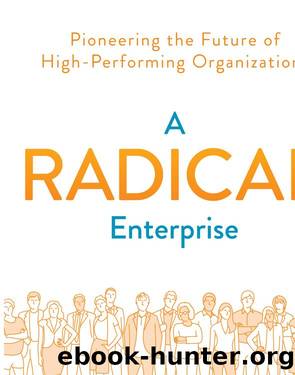A Radical Enterprise by Matt K. Parker

Author:Matt K. Parker
Language: eng
Format: epub
Publisher: IT Revolution Press
* * *
* Weâll revisit peer pods in Chapter 5, âDeficiency Gratification,â where weâll see that they are an example of a deficiency gratifying social structure.
Chapter 4
Imperative #2 Continued: The Devolution of Compensation
In the last chapter, we looked at the devolution of management along a number of dimensions, including leadership, hiring, firing, and governance. But thereâs one dimension of managerial devolution that we have yet to cover: the devolution of compensation. How our compensation is determinedâand who determines itâhas a significant impact not only on organizational performance but also on individual well-being. No discussion of radically collaborative devolution would be complete without an examination of this topicâand the topic is extensive enough, and foundational enough, that Iâve devoted this entire chapter to it.
The predominant compensation method found in organizations today is the annual performance appraisal, in which managers evaluate and rank their employees and make compensation adjustments based on those rankings on a yearly basis. Among organizations structured as dominator hierarchies, this method is widely implemented and widely maligned.
For example, YouGov, a global market research and data analytics firm, recently found that only 26% of employees associate performance evaluations with the term âuseful.â The remaining 74% associate it with terms like âtime-consuming,â âpointless,â and âstressful.â1
Likewise, Gartner, the global research organization, found that a full 96% of managers are dissatisfied with the annual performance appraisal process.2 Coupled with another finding that, on average, a full 60% of a managerâs rating is attributable to the subjective beliefs and biases of the manager, as opposed to any objective assessment of the employee being rated,3 it becomes hard to imagine a more problematic way to manage compensation.
Letâs look at just a few real-life accounts of how arbitrary and painful this process can be for employees:
After six and a half years and five strong/positive performance reviews, my company made some changes and hired a new person as my manager, while my former manager had another role. After four months, my new manager gave me my review, which was not even close to my historical reviews. I asked if he had consulted my former manager and was told: âAfter a few months, Iâm comfortable I know you well enough to not have to consult anyone.â4
In one of the organizations that I worked in, we were asked to fill out pages of answers to open-ended subjective questions. We did. Only to find out later that our manager had already filled in his ratings before he left for a vacation a week before we started writing the reviews. Our painstakingly written responses had absolutely no purpose apart from making us feel like we were writing something up.5
I was told that no one could score over a 3 (out of 5) this year because we had too much change to cope with . . . I over exceeded all my targets and spent £40k less than the previous year to achieve this. I feel a bit like companies of a certain size use them [reviews] as a means of not giving people the pay raises they deserve.
Download
This site does not store any files on its server. We only index and link to content provided by other sites. Please contact the content providers to delete copyright contents if any and email us, we'll remove relevant links or contents immediately.
Harry Potter and the Goblet Of Fire by J.K. Rowling(3025)
Never by Ken Follett(2873)
Shadow of Night by Deborah Harkness(2710)
Ogilvy on Advertising by David Ogilvy(2678)
Zero to IPO: Over $1 Trillion of Actionable Advice from the World's Most Successful Entrepreneurs by Frederic Kerrest(2377)
The Man Who Died Twice by Richard Osman(2290)
Machine Learning at Scale with H2O by Gregory Keys | David Whiting(2267)
Book of Life by Deborah Harkness(2259)
How Proust Can Change Your Life by Alain De Botton(2256)
My Brilliant Friend by Elena Ferrante(2218)
0041152001443424520 .pdf by Unknown(2214)
The Tipping Point by Malcolm Gladwell(2202)
How to Pay Zero Taxes, 2018 by Jeff A. Schnepper(2095)
Will by Will Smith(2033)
Purple Hibiscus by Chimamanda Ngozi Adichie(1979)
Hooked: A Dark, Contemporary Romance (Never After Series) by Emily McIntire(1932)
Borders by unknow(1780)
Rationality by Steven Pinker(1761)
Daughter of Smoke and Bone by Laini Taylor(1738)
